- Home
- Philip Roth
My Life as a Man
My Life as a Man Read online
Philip Roth
My Life As A Man
1974
To Aaron Asher and Jason Epstein
A NOTE TO THE READER
The two stories in part I,
“Useful Fictions,” and part II,
the autobiographical narrative
“My True Story,” are drawn from
the writings of Peter Tarnopol.
I could be his Muse, if only he’d let me.
—Maureen Johnson Tarnopol, from her diary
I
Useful Fictions
Salad Days
First, foremost, the puppyish, protected upbringing above his father’s shoe store in Camden. Seventeen years the adored competitor of that striving, hot-headed shoedog (that’s all, he liked to say, a lowly shoedog, but just you wait and see), a man who gave him Dale Carnegie to read so as to temper the boy’s arrogance, and his own example to inspire and strengthen it. “Keep up that cockiness with people, Natie, and you’ll wind up a hermit, a hated person, the enemy of the world—“ Meanwhile, downstairs in his store, Polonius displayed nothing but contempt for any employee whose ambition was less fierce than his own. Mr. Z.—as he was called in the store, and at home by his little son when the youngster was feeling his oats—Mr. Z. expected, demanded., that by the end of the workday his salesmen and his stock boy should each have as stupendous a headache as he did. That the salesmen, upon quitting, invariably announced that they hated his guts, always came to him as a surprise: he expected a young fellow to be grateful to a boss who relentlessly goaded him to increase his commissions. He couldn’t understand why anyone would want less when he could have more, simply, as Mr. Z. put it, “by pushing a little.” And if they wouldn’t push, he would do it for them: “Don’t worry,” he admitted proudly, “I’m not proud,” meaning by that apparently that he had easy access to his wrath when confronted with another’s imperfection.
And that went for his own flesh and blood as well as the hired help. For example, there was the time (and the son would never forget it—in part it may even account for what goaded him to be “a writer”), there was the time the father caught a glimpse of his little Nathan’s signature across the face of a booklet the child had prepared for school, and nearly blew their house down. The nine-year-old had been feeling self-important and the signature showed it. And the father knew it. “This is the way they teach you to sign your name, Natie? This is supposed to be the signature that somebody on the other end is supposed to read and have respect for? Who the hell can read something that looks like a train wreck! Goddam it, boy, this is your name. Sign it right!” The self-important child of the self-important shoedog bawled in his room for hours afterward, all the while strangling his pillow with his bare hands until it was dead. Nonetheless, when he emerged in his pajamas at bedtime, he was holding by its topmost corners a sheet of white paper with the letters of his name, round and legible, engraved in black ink at the center. He handed it over to the tyrant: “Is this okay?” and in the next instant was lifted aloft into the heaven of his father’s bristly evening stubble. “Ah, now that’s a signature! That’s something you can hold your head up about! This I’m going to tack up over the counter in the store!” And he did just that, and then led the customers (most of whom were Negroes) all the way around behind the register, where they could get a really close look at the little boy’s signature. “What do you think of that!” he would ask, as though the name were in fact appended to the Emancipation Proclamation.
And so it went with this bewildering dynamo of a protector. Once when they were out fishing at the seashore, and Nathan’s Uncle Philly had seen fit to give his nephew a good shake for being careless with his hook, the shoedog had threatened to throw Philly over the side of the boat and into the bay for laying a hand on the child. “The only one who touches him is me, Philly!” “Yeah, that’ll be the day…” Philly mumbled. “Touch him again, Philly,” his father said savagely, “and you’ll be talking to the bluefish, I promise you! You’ll be talking to eels!” But then back at the rooming house where the Zuckermans were spending their two-week vacation, Nathan, for the first and only time in his life, was thrashed with a belt for nearly taking his uncle’s eye out while clowning around with that goddam hook. He was astonished that his father’s face, like his own, should be wet with tears when the three-stroke beating was over, and then—more astonishing—he found himself crushed in the man’s embrace. “An eye, Nathan, a person’s eye—do you know what it would be like for a grown man to have to go through life without eyes?”
No, he didn’t; any more than he knew what it would be like to be a small boy without a father, or wanted to know, for all that his ass felt on fire.
Twice his father had gone bankrupt in the years between the wars: Mr. Z.’s men’s wear in the late twenties, Mr. Z.’s kiddies’ wear in the early thirties; and yet never had a child of Z.’s gone without three nourishing meals a day, or without prompt medical attention, or decent clothes, or a clean bed, or a few pennies “allowance” in his pocket. Businesses crumbled, but never the household, because never the head of the house. During those bleak years of scarcity and hardship, little Nathan hadn’t the faintest idea that his family was trembling on the brink of anything but perfect contentment, so convincing was the confidence of that volcanic father.
And the faith of the mother. She certainly didn’t act as though she was married to a businessman who’d been bankrupt and broke two times over. Why, the husband had only to sing a few bars of “The Donkey Serenade” while shaving in the bathroom, for the wife to announce to the children at the breakfast table, “And I thought it was the radio. For a moment I actually thought it was Allan Jones.” If he whistled while washing the car, she praised him over the gifted canaries who whistled popular songs (popular maybe, said Mr. Z., among other canaries) on WEAF Sunday mornings; dancing her across the kitchen linoleum (the waltz spirit oftentimes seized him after dinner) he was “another Fred Astaire”; joking for the children at the dinner table he was, at least to her way of thinking, funnier than anyone on “Can You Top This”—certainly funnier than that Senator Ford. And when he parked the Studebaker—it never failed—she would look out at the distance between the wheels and the curbstone, and announce—it never failed—“Perfect!” as though he had set a sputtering airliner down into a cornfield. Needless to say, never to criticize where you could praise was a principle of hers; as it happened, with Mr. Z. for a husband, she couldn’t have gotten away with anything else had she tried.
Then the just deserts. About the time Sherman, their older son, was coming out of the navy and young Nathan was entering high school, business suddenly began to boom in the Camden store, and by 1949, the year Zuckerman entered college, a brand new “Mr. Z.” shoe store had opened out at the two-million-dollar Country Club Hills Shopping Mall. And then at last the one-family house: ranch style, with a flagstone fireplace, on a one-acre lot—the family dream come true just as the family was falling apart.
Zuckerman’s mother, happy as a birthday child, telephoned Nathan at college the day the deed was signed to ask what “color scheme” he wanted for his room.
“Pink,” Zuckerman answered, “and white. And a canopy over my bed and a skirt for my vanity table. Mother, what is this ‘your room’ crap?”
“But—but why did Daddy even buy the house, if not for you to have a real boy’s room, a room of your own for you and all your things? This is something you’ve wanted all your life.”
“Gee whiz, could I have pine paneling, Mother?”
“Darling, that’s what I’m telling you—you can have anything.”
“And a college pennant over my bed? And a picture on my dresser of my mom and my girl?”
“Nathan, why are you
making fun of me like this? I was so looking forward to this day, and all you have for me when I call with such wonderful news is—sarcasm. College sarcasm!”
“Mother, I’m only trying very gently to break it to you—you just cannot delude yourself into thinking there is something called ‘Nathan’s room’ in your new house. What I wanted at the age of ten for all ‘my things,’ I don’t necessarily want any longer.”
“Then,” she said weakly, “maybe Daddy shouldn’t pay your tuition and send you a check for twenty-five dollars a week, if you’re that independent now. Maybe it works both ways, if that’s the attitude…”
He was not much impressed, either by the threat or the tone in which it was delivered. “If you want,” said he in the grave, no-nonsense voice one might adopt to address a child who is not acting his age, “to discontinue paying for my education, that is up to you; that is something you and Dad will have to decide between you.”
“Oh darling, what’s turned you into this cruel person—you, who were always so so sweet and considerate—?”
“Mother,” replied the nineteen-year-old, now a major in English language and literature, “try to be precise. I’m not cruel. Only direct.”
Ah, the distance he had traveled from her since that day in 1942 when Nathan Zuckerman had fallen in love with Betty Zuckerman the way men seemed to fall in love with women in the movies—yes, smitten by her, as though she weren’t his mother but a famous actress who for some incredible reason happened also to cook his meals and keep his room in order. In her capacity as chairwoman of the war bond drive at his school, she had been invited to the assembly hall that morning to address the entire student body on the importance of saving war stamps. She arrived dressed in the clothes she ordinarily wore only when she and her “girl friends” went in to Philadelphia to see the matinee performance of a stage show: her tailored gray suit and a white silk blouse. To top it off, she delivered her talk (without notes) from back of a lectern luxuriantly draped with red, white, and blue bunting. For the rest of Nathan’s life, he was to find himself unduly susceptible to a woman in a gray suit and a white blouse, because of the glamor his slender, respectable, well-mannered mother rathated from the stage that day. Indeed, Mr. Loomis, the principal (who may have been somewhat smitten himself), compared her demeanor as chairwoman of the bond drive and president of the PTA to that of Madame Chiang Kai-shek. And in shyly acknowledging his compliment, Mrs. Zuckerman had conceded from the platform that Madame Chiang was in fact one of her idols. So too, she told the assembled students, were Pearl Buck and Emily Post. True enough. Zuckerman’s mother had a deep belief in what she called “graciousness,” and a reverence, such as is reserved in India for the cow, toward greeting cards and thank you notes. And while they were in love, so did he. One of the first big surprises of Zuckerman’s life was seeing the way his mother carried on when his brother Sherman entered the navy to serve his two-year hitch in 1945. She might have been some young girl whose fiancé was marching off to the in the front lines, while the fact of the matter was that America had won World War Two in August and Sherman was only a hundred miles away, in boot camp in Maryland. Nathan did everything he could possibly think of to cheer her up: helped with the dishes, offered on Saturdays to carry the groceries home, and talked nonstop, even about a subject that ordinarily embarrassed him, his little girl friends. To his father’s consternation he invited his mother to come and look over his shoulder at his hand when “the two men” played gin rummy on Sunday nights at the bridge table set up in the living room. “Play the game,” his father would warn him, “concentrate on my discards, Natie, and not on your mother. Your mother can take care of herself, but you’re the one who’s going to get schneidered again.” How could the man be so heartless? His mother could not take care of herself—something had to be done. But what?
It was particularly unsettling to Nathan when “Mamselle” was played over the radio, for against this song his mother simply had no defense whatsoever. Along with “The Old Lamplighter,” it had been her favorite number in Sherman’s entire repertoire of semiclassical and popular songs, and there was nothing she liked better than to sit in the living room after dinner and listen to him play and sing (at her request) his “interpretation.” Somehow she could manage with “The Old Lamplighter,” which she had always seemed to love equally well, but now when they began to play “Mamselle” on the radio, she would have to get up and leave the room. Nathan, who was not exactly immune to “Mamselle” himself, would follow after her and listen through the door of her bedroom to the muffled sounds of weeping. It nearly killed him.
Knocking softly, he asked, “Mom…you all right? You want anything?”
“No, darling, no.”
“Do you want me to read you my book report?”
“No, sweetheart.”
“Do you want me to turn off the radio? I’m finished listening, really.”
“Let it play, Nathan dear, it’ll be over in a minute.”
How awful her suffering was—also, how odd. After all, for him to miss Sherman was one thing—Sherman happened to be his only older brother. As a small boy Nathan’s attachment to Sherman had been so pronounced and so obvious that the other kids used to make jokes about it—they used to say that if Sherman Zuckerman ever stopped short, his kid brother’s nose would go straight up Sherm’s ass. Little Nathan could indeed be seen following behind his older brother to school in the morning, to Hebrew school in the afternoon, and to his Boy Scout meetings at night; and when Sherman’s five-piece high-school band used to go off to make music for bar mitzvahs and wedding parties, Nathan would travel with them as “a mascot” and sit up in a chair at the corner of the stage and knock two sticks together during the rumbas. That he should feel bereft of his bother and in their room at night grow teary at the sight of the empty twin bed to his right, that was to be expected. But what was his mother carrying on like this about? How could she miss Sherman so, when he was still around—and being nicer, really, than ever. Nathan was thirteen by this time and already an honor student at the high school, but for all his intelligence and maturity he could not figure that one out.
When Sherman came home on his first liberty after boot camp, he had with him a ditty bag full of dirty photographs to show to Nathan as they walked together around the old neighborhood; he also had a pea jacket and a sailor cap for his younger brother, and stories to tell about whores who sat on his lap in the bars around Bainbridge and let him stick his hand right up their dresses. And for nothing. Whores fifty and sixty years old. Sherman was eighteen then and wanted to be a jazz musician à la Lenny Tristano; he had already been assigned to Special Services because of his musical talent, and was going to be MCing shows at the base, as well as helping the chief petty officer organize the entertainment program. He was also that rarity in show business, a marvelous comic tap dancer, and could give an impression of Bojangles Robinson that would cause his younger brother to double over with laughter. Zuckerman, at thirteen, expected great things from a brother who could do all this. Sherman told him about pro kits and VD films and let him read the mimeographed stories that the sailors circulated among themselves during the nights they stood guard duty. Staggering. It seemed to the adolescent boy that his older brother had found access to a daring and manly life.
And when, upon being discharged, Sherman made directly for New York and found a job playing piano in a bar in Greenwich Village, young Zuckerman was ecstatic; not so, the rest of the family. Sherman told them that his ambition was to play with the Stan Kenton band, and his father, if he had had a gun, would probably have pulled it out and shot him. Nathan, in the meantime, confided to his high-school friends stories about his brother’s life “in the Village.” They asked (those bumpkins), “What village?” He explained, scornfully; he told them about the San Remo bar on MacDougal Street, which he himself had never seen, but could imagine. Then one night Sherman went to a party after work (which was four in the morning) and met June Christie, Kenton�
�s blonde vocalist. June Christie. That opened up a fantasy or two in the younger brother’s head. Yes, it began to sound as though the possibilities for someone as game and adventurous as Sherman Zuckerman (or Sonny Zachary, as he called himself in the cocktail lounge) were going to be just about endless.
And then Sherman was going to Temple University, taking pre-dent. And then he was married, not to June Christie but to some girl, some skinny Jewish girl from Bala-Cynwyd who talked in baby talk and worked as a dental technician somewhere. Nathan couldn’t believe it. Say it ain’t so, Sherm! He remembered those cantaloupes hanging from the leering women in the dirty pictures Sherman had brought home from the navy, and then he thought of flat-chested Sheila, the dental technician with whom Sherman would now be going to bed every night for the rest of his life, and he couldn’t figure the thing out. What had happened to his glamorous brother? “He saw the light, that’s what,” Mr. Z. explained to relatives and friends, but particularly to young Nathan, “he saw the handwriting on the wall and came to his goddam senses.”
Seventeen years then of family life and love such as he imagined everyone enjoyed, more or less—and then his four years at Bass College, according to Zuckerman an educational institution distinguished largely for its lovely pastoral setting in a valley in western Vermont. The sense of superiority that his father had hoped to temper in his son with Dale Carnegie’s book on winning friends and influencing people flourished in the Vermont countryside like a jungle fungus. The apple-cheeked students in their white buck shoes, the Bastion pleading weekly in its editorial column for “more school spirit,” the compulsory Wednesday morning chapel sermons with visiting clergy from around the state, and the Monday evening dormitory “bull sessions” with notables like the dean of men—the ivy on the library walls, the dean told the new freshmen boys, could be heard on certain moonlit nights to whisper the word “tradition”—none of this did much to convince Zuckerman that he ought to become more of a pal to his fellow man. On the other hand, it was the pictures in the Bass catalogue of the apple-cheeked boys in white bucks crossing the sunlit New England quadrangle in the company of the apple-cheeked girls in white bucks that had in part drawn Zuckerman to Bass in the first place. To him, and to his parents, beautiful Bass seemed to partake of everything with which the word “collegiate” is so richly resonant for those who have not been beyond the twelfth grade. Moreover, when the family rode up in the spring, his mother found the dean of men—who three years later was to tell Zuckerman that he ought to be driven from the campus with a pitchfork for the so-called parody he had written in his literary magazine about the homecoming queen, a girl who happened to be an orphan from Rutland—this same dean of men, with briar pipe and football shoulders swathed in tweed, had seemed to Mrs. Zuckerman “a perfectly gracious man,” and that about sewed things up—that and the fact that there was, according to the dean, “a top-drawer Jewish fraternity” on the campus, as well as a sorority for the college’s dirty “outstanding” Jewish girls, or “gals,” as the dean called them.

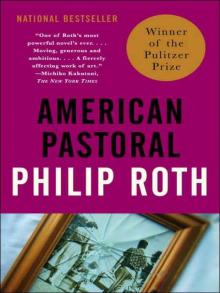 American Pastoral
American Pastoral The plot against America
The plot against America The Human Stain
The Human Stain Nemesis n-4
Nemesis n-4 Sabbath’s Theater
Sabbath’s Theater The Professor of Desire
The Professor of Desire Our Gang
Our Gang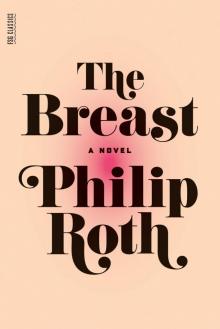 The Breast
The Breast Operation Shylock
Operation Shylock The Dying Animal
The Dying Animal Letting Go
Letting Go The Counterlife
The Counterlife Everyman
Everyman Nemesis
Nemesis Exit Ghost
Exit Ghost Portnoy's Complaint
Portnoy's Complaint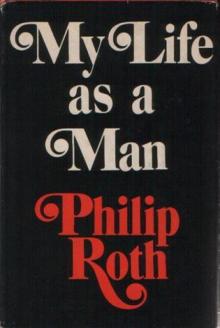 My Life as a Man
My Life as a Man I Married a Communist
I Married a Communist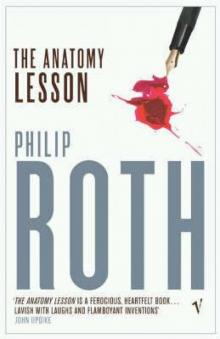 The Anatomy Lesson
The Anatomy Lesson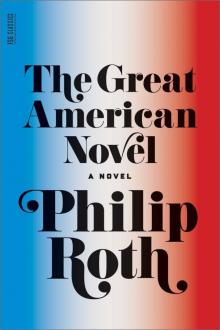 The Great American Novel
The Great American Novel Shop Talk
Shop Talk The Humbling
The Humbling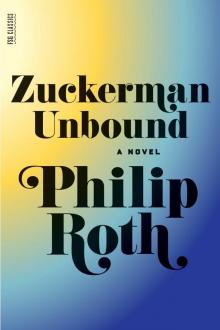 Zuckerman Unbound
Zuckerman Unbound When She Was Good
When She Was Good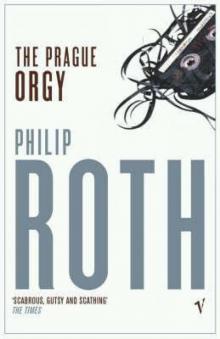 The Prague Orgy
The Prague Orgy American Pastoral (Nathan Zuckerman)
American Pastoral (Nathan Zuckerman) Goodbye, Columbus
Goodbye, Columbus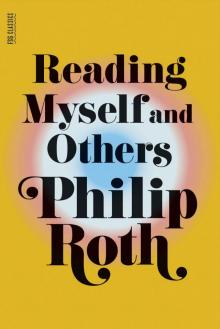 Reading Myself and Others
Reading Myself and Others